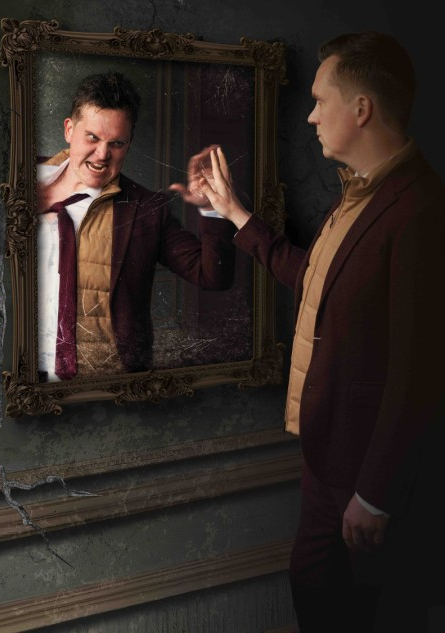Bard in the Botanics festival – Glasgow Botanic Gardens, until 29th July
REVIEWED BY RACHEL FARRIER
4****
Robert Louis Stevenson’s devilish story of double identity is given an electrifying telling in Jennifer Dick’s full-pelt adaptation at Glasgow Botanic Gardens. Condensed to a troupe of three performers, Stevenson’s mystery retains the creeping intensity of the original while adding an electric charge that builds towards a vivid, final confrontation.
Stephanie McGregor holds the whole together as the increasingly apprehensive and agitated Utterson, moving fluently between character and narrator. Adam Donaldson very effectively traces Jekyll’s descent from affable gentleman scientist to haunted and hunted man. But special mention must go to Sam Stopford, who so effectively conveys the ineffable horror and otherness of Hyde. Stevenson, in the novella, says that no-one who sees Hyde can put their finger on the reason for his demonic effect on people. In Stopford’s performance, I’d say it’s something to do with the way he drains the humanity from his eyes; but however he does it, I found myself increasingly unwilling to look at him for very long.
Sometimes, when staging plays in unconventional settings, the background can be just that: incidental. But the glasshouse backdrop, which framed the actors against a sea of green foliage and wrought ironwork, not only conjured the story’s Victorian origins, but aptly echoed its twisty depiction of the blurred lines between inside and outside (helped, no doubt, by the fact that rain dripped on the audience throughout the performance).
What criticisms can be levelled at the performance are probably a matter of taste. Stevenson’s downbeat ending is replaced by a confrontation of startling intensity (and, it must be said, volume). The intimacy of the setting, with the actors grappling or yelling in each other’s faces just inches from the audience, makes for an extremely vivid experience. What it gains on the original in forcefulness, however, it loses (slightly) in poignancy.
The other issue regards the central mystery of the story. Jekyll resolves to divide himself so as to be free of some aspect of his nature which he cannot abide. What this is, exactly, is never stated, although there are hints that it relates to his sexuality. Stevenson burned an early, apparently more explicit, draft of the story on the advice of his wife, who said that to publish would ruin him. While this performance updates the story in some respects—through costume and language, for instance—it declines to say very much at all about the Victorian morality that constrains Jekyll.
Nonetheless, Jekyll and Hyde’s depiction of a tormented, divided self is compellingly staged, with the simple device of clasping hands effectively standing in for thousands of dollars in Hollywood special effects.

